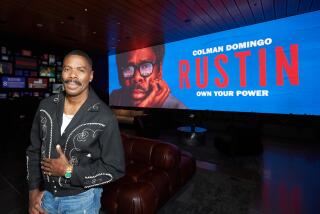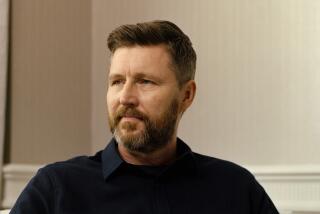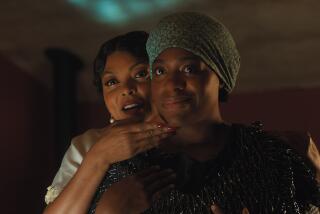The Envelope: A ‘lost story’ of ‘Pride’ touches on bonds, support and so much more
It’s an obscure bit of recent British history, the unlikely alliance between gay rights activists from London and striking Welsh coal miners in the 1980s.
“I often describe it as sort of a lost story, really,” says “Pride” screenwriter Stephen Beresford. “It’s one of those sort of Arthurian legends that gay people told each other.
“When I was about 21, I was having an argument with somebody who was older than me about whether gay people were still political. He was about 30, so he considered himself able to talk to me like he was Ché Guevara: ‘You’re not political; we were.’”
Beresford’s opponent brought up the then-current, second miner’s strike — this being the ‘90s — and called out the writer’s generation for not supporting them.
“You know, gay people are bullied out of those working-class, industrial communities, and they run away to London or wherever, Manchester, wherever they go, as fast as they can. So I said, ‘Why on Earth would I support the miners? They don’t support me,’ and in doing so, handed him the argument on a plate,” Beresford says.
And so the writer was told for the first time about Lesbians and Gays Support the Miners. LGSM was organized in 1984 to raise much-needed funds for the desperate strikers. The groups eventually overcame their differences to form a deep bond of mutual support.
“Pride,” directed by theater veteran Matthew Warchus, has earned a 94% positive rating on Rotten Tomatoes, won three British Independent Film Awards, including best British independent film, and received a Golden Globe nomination for motion picture, musical or comedy. Its cast includes stalwarts such as Bill Nighy, Paddy Considine, Imelda Staunton and Dominic West, and rising stars such as Andrew Scott and newcomer Ben Schnetzer.
But getting this far required some detective work by the screenwriter.
“It’s a pre-Google story, so there’s hardly any Internet trail at all,” Beresford says. “I got sent a book; it was a collection of firsthand testimonies of gay people from different decades, and the section on the ‘80s was all about [LGSM leader] Mark Ashton. It was the first time I got confirmation that the story was absolutely true.”
It was years more before he would find a video that LGSM made of themselves. Using the “Thanks to” titles at the end, he was finally able to track down some of those involved.
“There were a lot of things that could have gone wrong,” Warchus says. The film “could have patronized the working people, even though I grew up in a village like that. It could have patronized the LGBT community even though I had Stephen Beresford with me all the time, who — I was going to say ‘put me straight,’ but it’s the opposite — made sure I was queer enough.”
The filmmakers held what they called “counseling sessions” to discuss the characters and their backgrounds with the actors.
“I remember we had that session with Bill [Nighy], and we talked a lot about miners who were very literate and educated, the sort of quietness of his character. I said, ‘He reminds me of my Welsh grandfather, who’s very dour. He’s a bit like this.’ We’d do a face. And Bill said, ‘Yes, yes, I’ve got it,’” Warchus says, laughing.
Apart from its witty dialogue and small, personal moments, the film contains some larger set pieces. These include, yes, a bonding-dance scene. To the filmmakers’ credit, the show-stopping prancing of West — known mainly for tough guy roles as in “The Wire” and “300” — not only serves its dramatic purpose but feels organic.
“I couldn’t hold back, but I had to make sure it was grounded and tough all the time,” Warchus says. “So I had a lot of cameras rolling the first time people saw the dance, so their reactions were quite genuine.”
Since then, though, the most important reactions have come from viewers.
“I was in L.A. recently, and I had an Uber driver and she was a lesbian, and she started to tell me about the film, amazingly,” says Beresford, who stunned her by revealing he’d written it. “And then she told me … she had a very difficult time when she came out and she tried to kill herself — how difficult it was until she found other LGBT people who gave her pride in herself. She’s alive. She kept saying that: She’s alive.
“And at the end of the ride, she said, ‘Your movie will save lives.’”
More to Read
From the Oscars to the Emmys.
Get the Envelope newsletter for exclusive awards season coverage, behind-the-scenes stories from the Envelope podcast and columnist Glenn Whipp’s must-read analysis.
You may occasionally receive promotional content from the Los Angeles Times.






